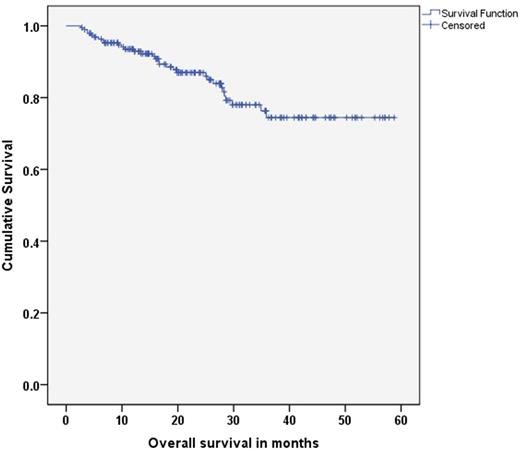Abstract
Background: The standard of care for patients with newly diagnosed multiple myeloma is induction chemotherapy using novel agents followed by autologous stem cell transplantation, if eligible. In resource limited countries, generic drugs have allowed wider access to novel agents. There is limited data on the outcome of patients treated with induction therapy with generic novel agents. Hence we evaluated the clinical outcomes of patients with newly diagnosed multiple myeloma initiated on a common induction therapy consisting of Cyclophosphamide - Bortezomib - Dexamethasone (CyBorD) using generic Bortezomib at two centres in India.
Objectives: The objective of the study was to evaluate (i) response to treatment (ii) progression free survival and (iii) overall survival in patients with MM who were treated with CyBorD regimen using generic Bortezomib as the first line of treatment.
Methods: We retrospectively analyzed data of all patients with newly diagnosed multiple myeloma treated with a uniform induction therapy of CyBorD during the study period from January 2012 to June 2016 at two tertiary care centres in India. A total of 195 patients were included. All received Bortezomib 2mgIV/SC on days 1,8 15 and 22; Cyclophosphamide 300mg/m2 IV/Oral on days 1, 8, 15 and 22; Dexamethasone 40 mg IV/Oral on days 1-4 and then weekly once. All drug dosages were prescribed as per the NCCN guideline. All drugs were given on a 28 day cycle and repeated for four cycles. The response to treatment and progression of disease were defined according to the IMWG criteria. Statistical analysis was done in SPSS version 20. Continuous variables were represented as mean (SD) and categorical variables as percentages. Survival analysis was computed by Kaplan -Meier method.
Results: The median age of patients was 58 years (range - 23 to 78 years). The proportion of females was 28.72%. The distribution of patients under International Staging System (ISS) I, II and III (n=157) were 24.84%, 28.66% & 46.5% respectively. The median number of CyBorD cycles were 4 (range 2 to 7). Five patients did not have assessment done at the end of induction chemotherapy. Of the remaining 190 patients, the proportion of patients with VGPR (very good partial response) or more, PR (partial response) and stable or progressive disease were 57.9%, 32.1% and 10% respectively. Following treatment with CyBorD, 123 (63.1%) received maintenance Bortezomib while 54 patients (27.69%) underwent an autologous stem cell transplant. On follow up, 59 patients (31.05%) had evidence of disease progression. The mean progression free survival (PFS) was 36.4 (95% CI 31.2-41.6) months and the mean overall survival (OS) was 48.95 (95% CI 45.86-52.05) months (Fig 1). The proportion of Grade III or higher non-hematologic and hematologic toxicity was 32.9% and 8.8% respectively. Peripheral neuropathy (n=22; 11.28%) was the major toxicity seen in our study. Among the 195 patients, 31 (15.90%) died at a median follow up of 21.7 months. The average expenditure for 16 weeks of treatment with generic Bortezomib is US$ 1137.6 USD compared to US$ 9850 for the innovator.
Conclusion: Treatment with CyBorD is an effective regimen in newly diagnosed MM patients. The regimen appears tolerable with manageable toxicities and at affordable costs in a resource limited setting.
Figure1- Overall survival (OS) of the patients: The mean overall survival (OS) was 48.95 (95% CI 45.86-52.05) months
Srivastava: Bayer Healthcare, Shire, Novo Nordisk, Roche Genentech, LFB: Other: Educational grants / Advisory Board / Grants Review / Data Monitoring Committee, Research Funding.
Author notes
Asterisk with author names denotes non-ASH members.


This feature is available to Subscribers Only
Sign In or Create an Account Close Modal